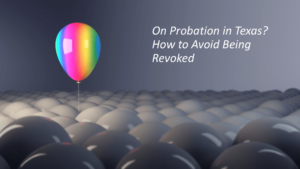You Took Probation, Now Go to Jail
 Why You Need a Good Criminal Defense Lawyer to Protect You From Probation Revocation
Why You Need a Good Criminal Defense Lawyer to Protect You From Probation Revocation
CONTACT OUR TEXAS CRIMINAL DEFENSE LAWYERS!
“When you’re on probation, your probation officer is always trying to catch you and revoke you. So that means you need to do everything you can to keep from being revoked, starting today.”
No, that’s not cynical commentary from a jaded criminal defense attorney frustrated with “the system” – it’s what a court probation officer told one of my very first criminal clients after I plead him to probation. And I realize, years later, he was absolutely right. The likelihood of being sanctioned, having probation terms extended, and eventually revoked from probation is astonishingly high in Texas.
Consider some sobering facts:
- 47% of all prisoners in Texas Department of Criminal Justice facilities are there because of probation/parole violations[1]
- Almost half of all inmates serving time for probation violations are for “technical” violations of probation[2] (meaning, these individuals didn’t commit new crimes, they just didn’t comply with each and every one of their probation conditions)
- The vast majority (approx. 80%) of inmates serving prison time for probation violations were on probation non-violent offenses[3]
Many of our clients think, “If I can get probation, it won’t be so bad. I didn’t rob anybody or assault anyone. At least I won’t be doing jail/prison time.” Think again. Aside from the financial costs imposed on probationers in Texas, and the difficulty that comes with trying to gain/maintain employment with a criminal offense on your record, take a look at the typical probation conditions that individuals have to comply with:
- commit no offense against the laws of this State or of any other state or of the United States;
- report to the supervision officer at all times as directed by the judge or supervision officer and obey all “rules and regulations” of the community supervision and corrections department;
- permit the supervision officer to visit the probationer at home or work;
- do not travel outside the county without permission;
- pay in one or more amounts the probationer’s fine, if one is assessed, and all court costs, regardless of whether a fine is assessed;
- if under custodial supervision in a community corrections facility: remain under that supervision, obey all rules and regulations of the facility, and pay a percentage of the probationer’s income to the facility for room and board and the probationer’s dependents for their support during the period of custodial supervision;
- submit to all random testing for alcohol or controlled substances
- counseling sessions for substance abusers or participate in substance abuse treatment services;
- submit to electronic monitoring;
- reimburse a law enforcement agency for the analysis, storage, or disposal of raw materials, controlled substances, chemical precursors, drug paraphernalia, or other materials seized in connection with the offense;
- submit a DNA sample to the Department of Public Safety under Subchapter G, Chapter 411, Government Code, for the purpose of creating a DNA record of the offender;
- reimburse the county in which the prosecution was instituted for compensation paid to any interpreter in the case.
This is just a partial list of the typical conditions applied to most probationers in Texas. The enormous expense of time, money, and effort required of an individual for them to comply with and avoid “technical violations” of probation is daunting, even for misdemeanor level offenses. As one judge told me while sitting on the bench, “You’ve basically made it too hard for people to successfully complete probation. And, I don’t know, I just don’t really think that’s fair.”
Probation isn’t a cake walk, it typically isn’t “fair,” and it comes with a serious drain on your time and your money and your dignity. And, as the statistics above indicate, it’s possible for you to serve most of your probation and then be told, “Sorry, you’re in violation of your probation. So here’s what happens next…”
Don’t let yourself fall into that trap. If you get arrested, make sure you get an attorney that will fight to keep you off probation in the first place, so you don’t have to run through the gauntlet of probation/sanction/revocation that awaits so many Texas probationers. And, if you are accused of violation your probation, that’s all the more reason to retain an attorney that will fight for you and keep you from being another “revocation statistic.”
If you or a loved one are accused of violating your probation, you need an aggressive and experienced criminal defense team working for you to make sure that you get your probation reinstated and successfully completed without going to jail or prison. Call the attorneys at Hamilton Grant today to make sure your rights are protected.
[1] “How Supervision Violations are Filling Prisons and Burdening Budgets,” Council of State Governments Justice Center; June 18, 2019.
[2] “Report to the Governor and Legislative Budget Board on the Monitoring of Community Supervision Diversion Funds,” Texas Department of Criminal Justice; December 1, 2018.
[3] “Report to the Governor and Legislative Budget Board on the Monitoring of Community Supervision Diversion Funds,” Texas Department of Criminal Justice; December 1, 2019.
